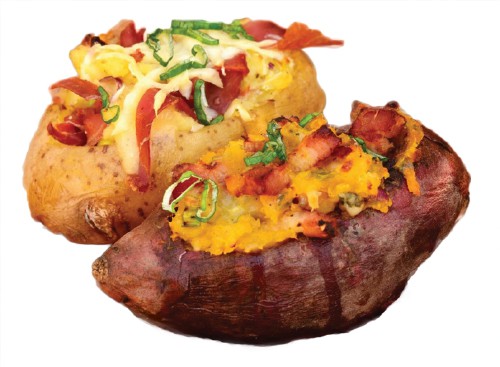The mornings are now colder and darker, and you’re wrapping up a little more when out on your run, so try these great recipes to keep you fueled and ready for your winter running, all while warming you up on the inside. – BY CHRISTINE PETERS, REGISTERED DIETICIAN
1 SALSA JACKET SWEET POTATO
High in fibre and iron, and low in fat, but go easy on the cream cheese. Sweet potato is also a great source of vitamin A and magnesium – the relaxation mineral! If you’re adamant about cutting down on the carbs, then sweet potato is the answer.
It gives you high levels of potassium, evening out blood pressure, but is low in fat. Serves: 1 Time to make: 10 minutes. (Note: You can also make it meat-free: Omit bacon and add 1/4 red capsicum, chopped.)
Ingredients
1 cooked baked sweet potato
1 rasher rindless eye bacon
1/2 x 400g can of mixed beans, drained, rinsed
1 spring onion, chopped
3 tablespoons salsa sauce
2 tablespoons extra-light Philadelphia cream cheese
Step 1: Cook bacon until crispy. Cut in pieces and mix with beans, spring onion and salsa sauce. Use to top jacket potato.
Step 2: Top with cream cheese and serve.
2 SCRAMBLED EGGS WITH SALMON
High in iron and protein, great to get you going in the morning! Also, salmon contains bioactive protein molecules that provide support for joint cartilage and insulin effectiveness. To mix it up, try using smoked salmon, smoked chicken, spring onions and a sprinkling of cayenne pepper or paprika. Serves: 2 Time to make: 10 minutes.
Ingredients
4 eggs
1/2 red capsicum, diced
Slices of lemon
6 tablespoons skimmed milk
115-150g cooked salmon
Freshly ground black pepper
2 tablespoons chopped fresh parsley
1 whole wheat Pita, toasted
Step 1: Place capsicum in a small microwave dish and cook on high for 30-40 seconds. Set to one side. Break salmon into bite-sized pieces.
Step 2: Beat eggs together with milk. Heat on high for a minute, beat with a fork and cook for another 30 seconds. Beat again and cook for a further 30 seconds. Remove from heat and add diced capsicum and salmon. Mix together and cook for a final 30 seconds – the eggs should still look a little wet. Season with pepper and parsley.
Step 3: Meanwhile, heat pita for 30 seconds and slice in half. Place on a serving plate and fill with scrambled eggs. Serve with a slice of lemon.
3 MOROCCAN CHICKPEA SOUP
Dairy-free, high in fibre and low in fat. Chickpeas curb hunger cravings and are also great for cholesterol. Garlic is also well-known for its antiviral properties, keeping you healthy in your winter training months. Serves: 4 Time to make: 25 minutes.
Ingredients
2 teaspoons olive oil
1 onion, finely chopped
1 large carrot, peeled, diced
2 sticks celery, trimmed, diced
2 cloves garlic, crushed
2 teaspoons Moroccan seasoning
2 x 400g cans chickpeas, rinsed, drained
400g can chopped tomatoes, no added salt
2 cups salt-reduced vegetable stock (or chicken stock) and 1 cup water
Black pepper, to season
Low-fat yoghurt, to serve (optional)
Coriander leaves, to garnish
Step 1: Heat oil in a large heavy-based saucepan over medium heat. Add onion, carrot and celery. Cook for 6 minutes or until vegetables are soft. Add garlic and seasoning.
Step 2: Add chickpeas, tomatoes and stock. Bring to the boil. Reduce heat to low and simmer for 15 minutes. Set aside to cool slightly.
Step 3: Place half the soup in a blender. Blend until smooth. Return to pan with remaining soup. Place over medium heat, season with pepper and warm through. Ladle into bowls, top with a dollop of yoghurt (if using) and garnish with coriander.
Winter Nutrition Tip: Eat More Oranges
We all know that oranges contain a healthy amount of vitamin C, so they’re recommended in the winter months to help us avoid colds and flu, but eat enough oranges and you may experience less muscle soreness after hard workouts as well.
That’s because oranges supply over 100 percent of the daily requirement for the antioxidant vitamin C, and studies have shown that taking vitamin C supplements for two weeks prior to challenging exercise helps alleviate muscle soreness.
This fruit's antioxidant powers also come from the compound herperidin, found in the thin orange-coloured outer layer of the fruit's skin (the zest). Herperidin has been shown to help lower cholesterol levels and high blood pressure as well.
So, add orange sections to fruit and green salads, or use the orange juice and pulp for sauces to top chicken, pork or fish. And to benefit from the herperidin, use the orange zest in baking and cooking. Select firm, heavy oranges, and store them in the fridge for up to three weeks.
Orange zest can be stored dried in a glass jar for about a week if kept in a cool place.


